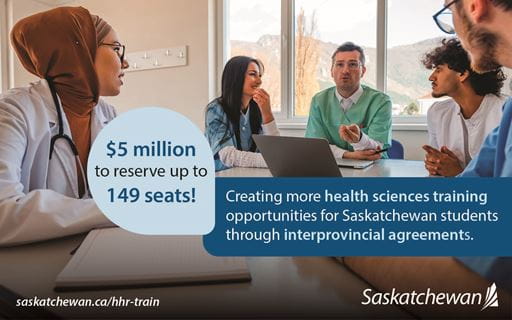Released on December 5, 2023
Saskatchewan students have more opportunities to access specialized training in high-demand health sciences programs through new and updated interprovincial agreements. This year, the Government of Saskatchewan is investing $5 million to reserve up to 149 seats in nine programs offered outside the province.
"Our government is committed to ensuring we have skilled health professionals in place to provide essential health services for patients across the province," Advanced Education Minister Gordon Wyant said. "These agreements allow Saskatchewan students to complete their clinical placements here at home, connecting students to jobs in the province and helping meet critical health care system needs."
Interprovincial agreements support the 'train' pillar of Saskatchewan's Health Human Resources Action Plan by helping provide a steady supply of specialized health care professionals to reduce labour shortages and help meet growing demand for services.

“My time studying at the University of Alberta helped prepare me for a meaningful career right here in Saskatchewan,” a recent graduate of the Speech-Language Pathology program Katelin Peters said. “Having seats reserved in specialized health care programs means more students will have the opportunity that I did to train for a career that supports patients across Saskatchewan and the health care system as a whole.”
The renewed agreements include seats in Cardiovascular Perfusion, Diagnostic Medical Sonography, Electroneurophysiology, Magnetic Resonance Imaging, Nuclear Medicine Technology, Occupational Therapy, Prosthetics and Orthotics, and Respiratory Therapy. Saskatchewan has also added a new agreement for Speech-Language Pathology that reserves up to 15 seats for students starting this fall.
“Speech-Language & Audiology Canada would like to thank the Government of Saskatchewan for their recognition of the importance of investing in additional seats for Saskatchewan students in Speech-Language Pathology; and expanding the scale of Saskatchewan's health training capacity demonstrates the government's commitment to strengthening our health care workforce,” Speech-Language & Audiology Canada CEO Dawn Wilson said. “Due to current and future shortages, our members are not adequately able to meet the needs of the population, in particular the growing aging population. Speech-Language Pathologists deliver care across the lifespan and play a vital role in the healthcare system, in both public and private settings in schools, hospitals, early years and long-term care.”
Saskatchewan offers 23 in-province health training programs to approximately 8,900 students annually. Interprovincial agreements provide Saskatchewan students with access to additional specialized health programs not available in the province. As demand for these programs increases, Saskatchewan is exploring the potential to offer more health sciences programs in the province. Proposals for Occupational Therapy, Speech-Language Pathology and Respiratory Therapy programs are under active consideration.
Students enrolled in interprovincial agreement programs may be eligible for various financial supports to help fund their education and connect them to careers in the Saskatchewan health system. Supports include Clinical Placement Bursaries, Return-in-Service Bursaries, the Graduate Retention Program and Saskatchewan Student Aid.
Applications for fall 2024 are still being accepted by certain programs. To learn more about each program, please visit saskatchewan.ca/hhr-train.
-30-
For more information, contact:
Media Relations
Advanced Education
Regina
Phone: 306-787-0355
Email: ae.media@gov.sk.ca
Cell: 306-510-2570

